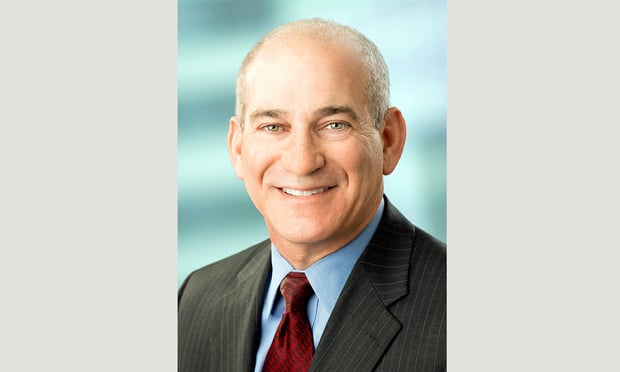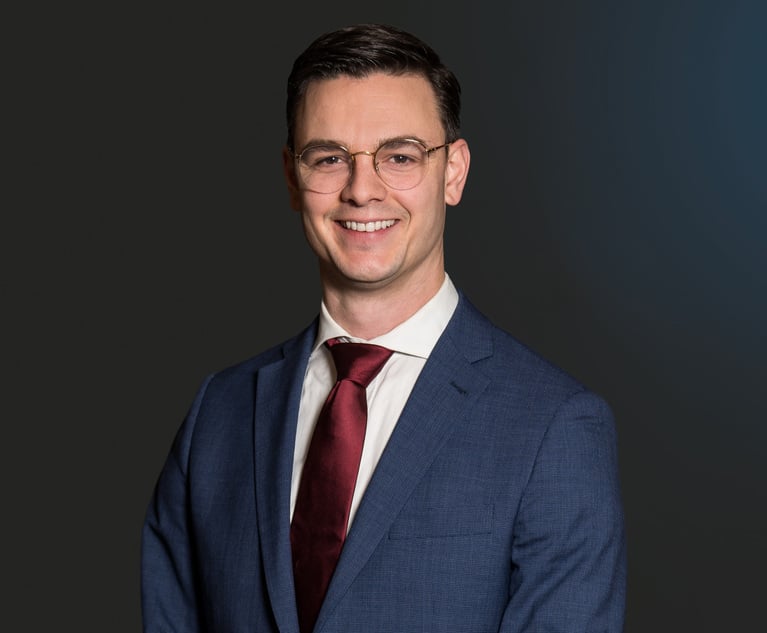'Slowly and Cautiously': Flaster Greenberg's Strategy to Reopen in the World of COVID-19
The firm aims to open its Pennsylvania and New Jersey offices mid-June.
June 03, 2020 at 01:35 PM
6 minute read
 Alan Zuckerman, Flaster Greenberg.
Alan Zuckerman, Flaster Greenberg.
Managing shareholder of Flaster Greenberg, Alan Zuckerman, shared his firm's carefully designed strategy to reopen its physical offices and operate safely as the COVID-19 economic recovery progresses.
Flaster is a midsize commercial business law firm with about 50 attorneys, including 15 in Philadelphia. Headquartered in Cherry Hill, New Jersey, the firm also has offices elsewhere in Pennsylvania and New Jersey, and in New York, Delaware and Florida. The firm represents businesses, such as technology companies, manufacturers, commercial real estate developers and health care providers, and also represents individuals in many matters, including estate planning, tax, and family law. Zuckerman is a corporate transactional and tax lawyer.
Pennsylvania Gov. Tom Wolf has rolled out plans to gradually reopen businesses as pandemic-induced closures have ravaged companies large and small across the state. Only 10 out of Pennsylvania's 67 counties remain in the red phase as of Wednesday, and all counties in the state will have moved to at least the yellow phase of reopening by Friday, it is expected.
The firm aims to open its Pennsylvania and New Jersey offices mid-June.
Zuckerman's responses were edited lightly for style.
ALM: What sources are guiding you and other firm leadership in forming your strategy to safely reopen the firm?
Zuckerman: We had a non-lawyer management team, comprised of five head administrators, that met over several weeks. I met with the team and we submitted our plan to the firm's board of directors, which made a few policy suggestions, and then approved it.
We consulted with a physician at a hospital who was part of their COVID-19 response, to advise us in our policy decisions and to make them as science-based as possible. We wanted the opinion of someone who had firsthand experience with the COVID response and the appropriate safety measures.
We are relying heavily on CDC guidelines, and the PA and NJ Department of Health guidelines.
We are following OSHA's "Guidance on Preparing Workplaces for COVID-19."
We are also looking at local bar association guidelines, and the New York Bar Association recently published general guidelines.
An engineer advised us on how to minimize the risk of the virus spreading through the HVAC system. We'll run the HVAC for 24 hours before employees initially return, and then on a daily basis, for at least an hour before employees enter the building.
We are consulting with our HR director and our attorney who heads our employment department regarding HR issues.
ALM: What are the policies and safety procedures that will be in place when employees return to your physical offices?
Zuckerman: There are a total of 100 employees at the firm, including about 50 staff members. We are initially allowing employees to come for two days per week.
We have divided our employees into "Group A" and "Group B," giving all the option to work remotely. We will have not more than 50% of our employees in the office at any time. A and B are divided strategically by job and geographic location within the physical office, so that employees will be socially distanced.
We are using an honor system for temperature screenings. Each employee will take their own temperature at home before coming to the office, and will check themselves for symptoms. A temperature of 100 degrees and above means stay home. We purposely said, if you have any symptoms, then stay home, since COVID can manifest so differently in different people.
At least one third of the people with COVID are asymptomatic, and you need to get close to people to take a forehead temperature scan. Also, the warm weather may make temperature reads higher, and people lining up in the office together is a concern.
Masks are required for all employees and visitors. We are providing one washable, reusable mask to each employee, and will have disposable masks in the office. Wipes and hand sanitizer will be placed near all common and high-touch areas, so surfaces, such as copiers, can be disinfected between each use. Even internal meetings will be conducted via Zoom.
We are putting up plexiglass by reception areas, and have rearranged office furniture and roped off certain common areas. Our cleaning service is coming daily, and we made sure they are using the right chemicals for COVID.
Eating in the common areas will be prohibited. Employees can eat individually at their desks, or go outside, since masks must be worn at all times when around other people.
We are not allowing employees to take public transportation initially, and no interoffice travel.
Some employees say they want to come back as soon as possible, while others prefer to stay home. We are going to try and accommodate people as much as we can. We understand employees have different health and child care issues. People have different mental health needs, and we understand some employees need to be out and about, and some are very anxious about being outside the home.
ALM: What sources are guiding your firm's decisions regarding HR issues?
Zuckerman: Our HR director and our attorney who heads our employment department has advised us on HR issues, such as how to communicate if an employee has COVID, sick time, and policy regarding employees who want to continue working remotely.
If an employee tests positive for COVID, they should email HR and it will be kept confidential. If that happens, we do plan to let our employees know that we had someone in the office who tested positive. We will do contact tracing of others that had contact with the employee, but will keep their identity confidential. We will keep records of all those that access the office for this purpose.
If an employee has someone in their household that has tested positive for COVID, we are going to handle this on a case-by-case basis, but will err on the side of isolation.
Last week we had a town hall Zoom conference with all of our employees to ask if there were questions, before formalizing the plan. We received very positive feedback regarding the safety measures and policies we are taking.
ALM: What are you monitoring as you move forward in terms of policies and employees?
Zuckerman: We are going to monitor if our employees report any adverse health issues, and we will see how productive employees are on the A and B schedule, but some of it will have to be reactive management.
We need to open our economy, but we need to do it slowly and cautiously. And, if there are pockets of outbreaks, we will be better prepared than we were a few months ago.
This content has been archived. It is available through our partners, LexisNexis® and Bloomberg Law.
To view this content, please continue to their sites.
Not a Lexis Subscriber?
Subscribe Now
Not a Bloomberg Law Subscriber?
Subscribe Now
NOT FOR REPRINT
© 2025 ALM Global, LLC, All Rights Reserved. Request academic re-use from www.copyright.com. All other uses, submit a request to [email protected]. For more information visit Asset & Logo Licensing.
You Might Like
View All
Visa Revocation and Removal: Can the New Administration Remove Foreign Nationals for Past Advocacy?
6 minute read
Saul Ewing Loses Two Partners to Fox Rothschild, Marking Four Fla. Partner Exits in Last 13 Months
3 minute read
Exceptional Growth Becoming the Rule? Demand Drove Strong Year for Big Law
Law Firms Mentioned
Trending Stories
Who Got The Work
J. Brugh Lower of Gibbons has entered an appearance for industrial equipment supplier Devco Corporation in a pending trademark infringement lawsuit. The suit, accusing the defendant of selling knock-off Graco products, was filed Dec. 18 in New Jersey District Court by Rivkin Radler on behalf of Graco Inc. and Graco Minnesota. The case, assigned to U.S. District Judge Zahid N. Quraishi, is 3:24-cv-11294, Graco Inc. et al v. Devco Corporation.
Who Got The Work
Rebecca Maller-Stein and Kent A. Yalowitz of Arnold & Porter Kaye Scholer have entered their appearances for Hanaco Venture Capital and its executives, Lior Prosor and David Frankel, in a pending securities lawsuit. The action, filed on Dec. 24 in New York Southern District Court by Zell, Aron & Co. on behalf of Goldeneye Advisors, accuses the defendants of negligently and fraudulently managing the plaintiff's $1 million investment. The case, assigned to U.S. District Judge Vernon S. Broderick, is 1:24-cv-09918, Goldeneye Advisors, LLC v. Hanaco Venture Capital, Ltd. et al.
Who Got The Work
Attorneys from A&O Shearman has stepped in as defense counsel for Toronto-Dominion Bank and other defendants in a pending securities class action. The suit, filed Dec. 11 in New York Southern District Court by Bleichmar Fonti & Auld, accuses the defendants of concealing the bank's 'pervasive' deficiencies in regards to its compliance with the Bank Secrecy Act and the quality of its anti-money laundering controls. The case, assigned to U.S. District Judge Arun Subramanian, is 1:24-cv-09445, Gonzalez v. The Toronto-Dominion Bank et al.
Who Got The Work
Crown Castle International, a Pennsylvania company providing shared communications infrastructure, has turned to Luke D. Wolf of Gordon Rees Scully Mansukhani to fend off a pending breach-of-contract lawsuit. The court action, filed Nov. 25 in Michigan Eastern District Court by Hooper Hathaway PC on behalf of The Town Residences LLC, accuses Crown Castle of failing to transfer approximately $30,000 in utility payments from T-Mobile in breach of a roof-top lease and assignment agreement. The case, assigned to U.S. District Judge Susan K. Declercq, is 2:24-cv-13131, The Town Residences LLC v. T-Mobile US, Inc. et al.
Who Got The Work
Wilfred P. Coronato and Daniel M. Schwartz of McCarter & English have stepped in as defense counsel to Electrolux Home Products Inc. in a pending product liability lawsuit. The court action, filed Nov. 26 in New York Eastern District Court by Poulos Lopiccolo PC and Nagel Rice LLP on behalf of David Stern, alleges that the defendant's refrigerators’ drawers and shelving repeatedly break and fall apart within months after purchase. The case, assigned to U.S. District Judge Joan M. Azrack, is 2:24-cv-08204, Stern v. Electrolux Home Products, Inc.
Featured Firms
Law Offices of Gary Martin Hays & Associates, P.C.
(470) 294-1674
Law Offices of Mark E. Salomone
(857) 444-6468
Smith & Hassler
(713) 739-1250






